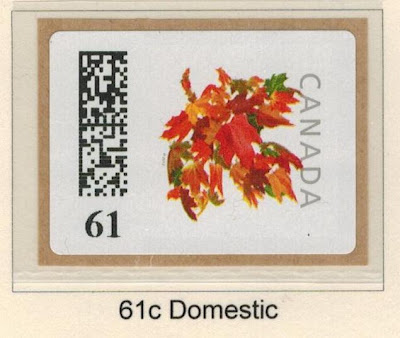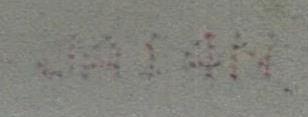The machine dispensed self-adhesive label stamps for the basic letter rates, domestic, U.S. and international, as well as stamps for oversize letters and parcel labels. The kiosk system calculated the postage for letters and parcels with the integrated scale in the side car.
Wincor Nixdorf stamp dispensed from self-serve kiosk
Denomination and bar code printed on pre-printed label with artwork
Similar machines have been in use world-wide for several years. Collectors commonly refer to these label stamps as ATM stamps for the German abbreviation "Automatenmarken", and not for Automated Teller Machine.
Station B, Toronto, kiosk installed late January, 2013
The original kiosk at Station B, Toronto, was replaced by this model in late January, 2013.
The following notice was published by Canada Post on its Facebook page on January 15, 2013:
Did you know—Canada Post is introducing self-serve kiosks throughout Canada. Users can purchase pre-printed stamps and choose their rate of postage (domestic, U.S., oversized and International). The stamp image, shown here, is pre-printed with secure fluorescent ink on label stock, with the kiosk printing a 2D barcode and a postage amount that can be read by Canada Post cancelling and sorting equipment. Currently, kiosks can be found in Toronto at the Adelaide Post office, 31 Adelaide St E; Station B, 119 Spadina Ave; and The Toronto Dominion Building, 52B - 66 Wellington St W. Find them in London at 387 Wellington Rd. and in Vancouver at 349 West Georgia St. (Main); The Bentall Centre, 595 Burrard Street, and in London Drug Stores at 710 Granville St. and 525 West Broadway. Watch this page for news of more to come as well as details on the OFDC.
ATM STAMPS
a) December 12, 2012 -January 13, 2013
Stamps shown below were purchased at the Toronto-Dominion Centre post office, Friday, January 10, 2013.
100g ≤ 200g domestic letter $2.10
400g ≤ 500g domestic letter $3.65
A total of nine different denominations was available.
Receipts
First Day Cover
On March 5, 2013, Canada Post released its Kiosk postage label Official First Day Cover, priced at $1.61 each. The 61 cent domestic letter rate denomination was the only label affixed to the cover.
Back
Unique 2D Bar Code Identifier
The Bar Code identifier may be the most significant aspect of the kiosk stamp label trials. Canada Post is the owner of a patent issued on April 22, 2008, involving bar code identifiers on postage stamps (Unique identifier bar code on stamps and apparatus and method for monitoring stamp usage with identifier bar codes ) .
According to the patent, the embodiments of the invention in which an exclusive property or privilege is claimed are defined as follows:
A postage stamp for general circulation comprising;
a first area containing postage stamp artwork; and
a second area containing a unique identifier bar code allowing individual identification of the postage stamp.
....
Patent Drawings
Canada Post has not revealed the information embodied in the bar codes but it can be assumed that it includes an identification number for the stamp, date and location of printing, and denomination.
Kiosk stamp 2D Bar Code Identifier
Covers
On Friday January 10, 2012, I deposited four covers stamped with the kiosk labels in the mail box next to the kiosk at the Toronto-Dominion Corporate Station. The results were disappointing especially when the original basic set of three stamps is selling for $100+ on eBay.
The resulting markings or lack thereof are likely related to the 2D bar code information.
Canada Rate

Cover 1
Canada Post ball-point pen marking
Cover 2 was culled and a postal employee used a porelon roller to mark the label.
The back of Cover 2 was sprayed with the familiar Visual Encoder System
(VES) orange bars above the base of the envelopes. The VES keeps
track of envelopes as it makes their way through the processing
equipment.
Cover 2
Porelon cancel
VES bars on the back of Cover 2
Unfortunately the VES bars were not applied at the Toronto Mail Processing Plant on January 10, the date of mailing, but on Monday January 14, the day domestic letter rates had increased to 63 cents.
JA 14 M
VES bar code date
To show this rate I mailed a letter (Cover 3) to General Delivery, San Juan, Puerto Rico, a destination to which the U.S. letter rate of $1.05 applied.
A dated machine cancellation was not applied. Instead, the letter was culled and a porelon roller was used to mark the kiosk label
Cover 3
JA 11 M
VES bar code date (traced over)
International Rate
My fourth cover was addressed to Poste Restante, Brussels, Belgium and was returned in July, 2013. An ink-jet cancel was sprayed-on the Kiosk stamp but it is not possible to male out the date. The cancel may have been applied when the letter was returned to Canada.
Cover 4
The VES bar code was date January 11, 2013, the day I mailed the letter.
My objective in mailing the covers on January 11 was to have evidence that the four Kiosk-label franked letters were cancelled before letter rates increased on Monday, January 14, 2013. I was only partially successful.
b) From January 14, 2013
Labels with new denominations were printed starting January 14, 2013 when the letter rates increased.
Basic Letter Rates
63c Domestic Letter Rate
$1.10 U.S. Letter Rate
$1.85 International Letter Rate
Parcel Label
Th machine prints a standard parcel label which is the same as a label printed at a counter.
1.36 kg Toronto local parcel
The label indicates that it was printed at Kiosk V1.6
Parcel Label Receipt
Strips March, 2013
At first, individual labels were printed but in March 2013 multiples were printed in strip format.
a) Same Denomination
b) Different Denominations
.............................................................................................................................................................................
The Mailomat
The 2012-2013 Wincor Nixdorf machine trials is not the first time the
Canadian post office has looked into self-serve kiosks. In 1938, Canada
Post Office introduced a coin-operated postage meter machine for public
use
manufactured by the Pitney-Bowes Postage Meter Company. The
"Mailomat" was
first introduced in Canada, on an experimental basis, in the lobby of
the Toronto post office in 1938.
The Mailomat made one operation of purchasing postage and mailing letters. The customer simply dropped money in the coin slot, dialed the correct postage denomination, and inserted the letter in a slot. The machine printed a meter stamp containing the date of the mailing, and held the letter until it was collected by postal workers.
Toronto 1938
First Day of Operation

Toronto to Stamford, September 21, 1938
3 cents U.S. surface letter rate

Ottawa 1944
The next experimental operation was at the Ottawa Station B post office.

(The Billboard, February 26, 1944)
First Day

Ottawa to Kansas City, February 3, 1944
4 cents surface letter rate to the United States

Cachet

Insert


A second Ottawa cover:

Ottawa to Memphis, February 26, 1944
4 cents surface letter rate to the United States

Toronto CNE 1947
A Mailomat machine was operated at Toronto's 1947 CNE.

Toronto to Rochester, September 2, 1947
3 cents surface post card rate to the United States


Front of Post Card made available to patrons

Canadian Postage Meters Ltd. envelope
Toronto to Hamilton, August 26, 1943































